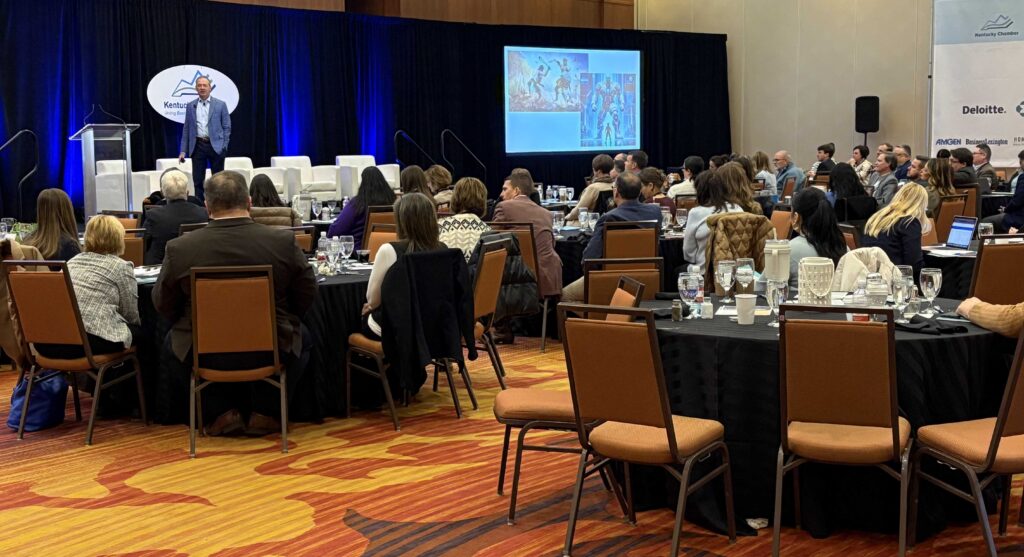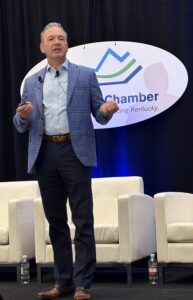Artificial intelligence was hot topic at Kentucky Chamber’s inaugural Healthcare Innovation Summit

By Melissa Patrick
Kentucky Health News
Artificial intelligence was one of the hot topics at the Kentucky Chamber of Commerce‘s inaugural Healthcare Innovation Summit, held Feb. 21 in Louisville.
The all-day event hosted leaders from businesses, health insurance companies, hospitals, government and pharmaceutical companies to discuss the state’s evolving health care landscape and the role each of these groups plays in shaping the future of health care in Kentucky.

Keynote speaker Dr. Bill Fera of Deloitte Consulting talked about the growing role of artificial intelligence in health care.
“This is probably the most excited I have been about information technology in about 25 years,” he said.
Fera outlined how AI is revolutionizing the health care industry by creating efficiency improvements in back-office processes, call centers and administrative tasks. In particular, he noted the potential of AI to improve the efficiency and accuracy of claim adjudication.
He said it also can be used to enhance patient outcomes and provider care, from predictive analytics and automation to robotics and advanced diagnostics.
Fera added that as AI is integrated into health care systems, it will allow providers to better focus on the human aspects of their profession, pointing to the current state of data collection that often results in providers spending more time on the computer than making eye contact with their patients.
Fera stressed that all of this will be done “with the help of AI,” and not instead of human involvement. As an example, he pointed to the challenges of hiring enough nurses, calling AI the nurse’s “teammate.”
“So if I have a nurse teammate that can do some tasks that the nurse doesn’t have to do, make some phone calls, follow up on some labs, check in on their pre-operative visit to make sure that the patient understands what’s happening,” he said. “We are not, I promise, we are not replacing nurses. . . . We’re going to help them focus on the things that are important. And the same thing with our clinicians.”

Reba Celsor, CEO of Spring View Hospital, recognized that there is some fear associated with AI, but said she was excited about the benefits it will bring to hospitals.
“AI is going to be telemedicine on steroids,” she said. “I feel confident that when this takes off, it will have a very positive impact on rural healthcare and all healthcare, because it will actually reduce spending and it will make it so much more efficient.”
Matt Grimshaw, market president of CHI Saint Joseph Health, urged hospitals to get ahead of this issue.
“I think our industry is ripe to get turned upside down,” he said. He later added, “But my question for us as a state, for us as a nation is, will we be nimble enough to adopt new standards that allow us to do better with technology to care for patients? My fear is we won’t and that others will come around us before we’re able to adjust. It’ll be too late for the hospital industry.”
Russ Cox, president and CEO of Norton Healthcare, emphasized the importance of AI in improving efficiency and access, but said this should never replace the need for human interaction.
“One of the things that worries me is that we don’t want to go too far in replacing that human touch of healthcare. . . . I think what it does for us is that it makes the people that we have better. It makes the quality that we’re able to achieve better — but it still takes human oversight. It still takes being able to read a circumstance, a situation with a patient and a family that a bot can’t do.”
Going forward, Cox said higher education needs to understand that we need people with “high emotional intelligence that’s able to blend with artificial intelligence to achieve not only better outcomes, but a better sense of human interaction.”